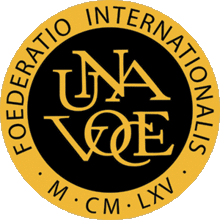Una Voce
 Logo of the Una Voce International Federation | |
| Formation | 8 January 1967 |
|---|---|
President | Joseph Shaw |
Key people | Dr Eric Vermehren de Saventhem (founding President), Michael Davies |
| Affiliations | Catholic Church |
The Fœderatio Internationalis Una Voce or simply Una Voce (Latin for ‘[With] One Voice’; from the preface to the Roman Canon) is an international federation of Catholic lay organizations attached to the Tridentine Mass.[1][2]
History
[edit]The Fœderatio Internationalis Una Voce (or FIUV) was founded on December 19, 1964 in Paris by Georges Cerbelaud-Salagnac in order to promote the Tridentine Mass from the Pre-Vatican II Missale Romanum (1962).[3][4] The organization argues that while the Second Vatican Council had introduced vernacular liturgies, it did not actually forbid the Latin Mass, and that regular weekday and Sunday Masses in Latin should be maintained.[5] The organization also seeks to promote Latin Gregorian Chant, sacred polyphony and sacred art.[3][4] Unlike some of the other Catholic traditionalist organizations, Una Voce seeks to remain faithful to the Pope within the Catholic Church,[3][4][6] and asserts that the Tridentine and the vernacular masses should be allowed to co-exist.[4][6][7] Among its prominent early members were the composers Maurice Duruflé and Olivier Messiaen.[3][8]
A number of national associations developed during 1964 and 1965, and in 1966 an international association, the Fœderatio Internationalis Una Voce was formed. It currently has over two dozen national affiliates.[3][5][9]
FIUV members value the traditional Latin Mass as direct link with the early Church and for conveying the mystery and majesty of God,[10][11] but have been critiqued for elitism and for its emphasis on private religious devotion.[11] The group has been described as an “arch-conservative” organization by Episcopal Church organist James E Frazier.[3] However, members of the FIUV reject comparisons to fundamentalism.[10]
FIUV was enthusiastic about the election of Joseph Cardinal Ratzinger as the Pope in 2005.[12][13] He took the name of Benedict XVI. He had spoken at a conference, and had praised FIUV's role in supporting the use of the Roman Missal within the guidelines set out by the Vatican.[14][15] The organization's influence at the highest levels of the Vatican has led to the authorization of the Tridentine Mass without specific permission or indult by local bishops, and the wider implementation of the motu proprio, Summorum Pontificum.[3][11][16]
Membership
[edit]The International Federation represents 42 member associations in Argentina, Australia, Austria, Belarus, Belgium, Brazil, Canada, Chile, Costa Rica, Colombia, Croatia, Cuba, Czech Republic, England and Wales, Estonia, Finland, France, Germany, India, Ireland, Italy, Japan, Latvia, Malta, Mexico, the Netherlands, New Zealand, Nigeria, Norway, Peru, the Philippines, Poland, Portugal, Puerto Rico, Russia, Scotland, Singapore, South Africa, Spain, Switzerland, Taiwan, Ukraine and the USA. Requests for information and assistance have come from Denmark, Honduras, Hungary, Indonesia, Kenya, Korea, Lithuania, Luxembourg, Panama, Sarawak (Malaysian Borneo) and Slovenia.
Council
[edit]At the XXVI General Assembly, held in Rome the 28 October 2023, the Council was elected and constituted as follows:[17]
- President: Dr. Joseph Shaw (Latin Mass Society of England and Wales)
- President d’Honneur: Jacques Dhaussy (Una Voce France)
- Vice Presidents: Don Felipe Alanís Suárez (Una Voce Mexico) and Jack Oostveen (Ecclesia Dei Delft, Netherlands)
- Secretary: Andris Amolins (Una Voce Latvia)
- Treasurer: F. Monika Rheinschmitt (Pro Missa Tridentina, Germany)
- Patrick Banken (Una Voce France)
- David Reid (Una Voce Canada)
- Jarosław Syrkiewicz (Una Voce Polonia)
- Fabio Marino (Una Voce Italy)
- Rubén Peretó Rivas (Una Voce Argentina)
- Catharina Chen (Una Voce Sinica, China)
See also
[edit]References
[edit]- ^ Noonan, Erica (March 2, 2008). "Latin Mass finds home Traditional service draws the faithful to Newton parish". Boston Globe. Retrieved 2009-02-25.
- ^ Winfield, Nicole (27 May 2007). "Pope overrides objections on traditional Mass". USA Today. Retrieved 2009-02-25.
- ^ a b c d e f g Frazier, James E (2007). Maurice Duruflé. Boydell & Brewer. pp. 223–4, 331. ISBN 978-1-58046-227-3.
- ^ a b c d Crouan, Denis; Sebanc, Mark (2001). The Liturgy After Vatican II: Collapsing Or Resurgent?. Ignatius Press. p. 29. ISBN 978-0-89870-841-7.
- ^ a b Waquet, Francois (2001). Latin: A Symbol's Empire. Verso. p. 75. ISBN 978-1-85984-615-5.
- ^ a b "Catholic group requests church where all Masses are in Latin". Archived from the original on June 3, 2008. Retrieved 2009-02-28.
{{cite web}}: CS1 maint: bot: original URL status unknown (link) - ^ Tu, Janet I. (17 September 2007). "Latin Mass is welcomed by traditionalists". The Seattle Times. Retrieved 2009-02-27.
- ^ Frölich, Laurent (2002). Les catholiques intransigeants en France (in French). L'Harmattan. pp. 90–91. ISBN 978-2-7475-1619-8.
- ^ Kocik, Thomas M. (2003). The Reform of the Reform?. Ignatius Press. p. 13. ISBN 978-0-89870-946-9.
- ^ a b Ferkenhoff, Eric (June 25, 2007). "A Return to the Latin Mass Clashes with congregants may erupt as a growing number of young priests push for a revival of pre-Vatican II customs". U.S. News & World Report. Archived from the original on December 1, 2008. Retrieved 2009-02-26.
- ^ a b c Horgan, Dennis (15 July 1985). "Latin mass in Niagara seen as sweet vindication". The Globe and Mail. pp. P11.
- ^ Three Years of Pope Benedict XVII: The Genie is Out of the Bottle..., by Ingrid H. Shafer
- ^ Bridges and, Amos; Leicht, Linda (April 20, 2005). "Swift pick surprises faithful Local Catholics react with excitement, hope and trepidation after conclusion of conclave". Springfield News-Leader. Archived from the original on April 20, 2005. Retrieved 2009-02-25.
- ^ Catholic Group Holds Conference To Discuss Developments Under Pope Benedict XVI Archived 2011-07-21 at the Wayback Machine at PRNewsNow
- ^ Allen, John L. (2001). Pope Benedict XVI: A Biography of Joseph Ratzinger. Continuum International Publishing Group. p. 72. ISBN 978-0-8264-1361-1.
- ^ summorum pontificum
- ^ "Foederatio Internationalis Una Voce".
